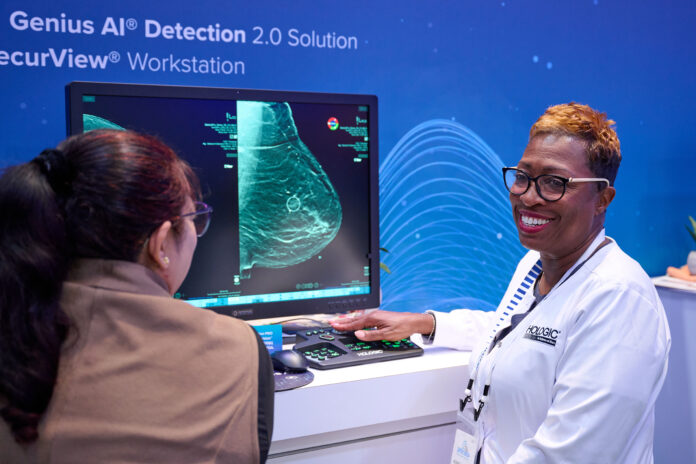MARLBOROUGH, Mass.– Hologic, Inc. (Nasdaq: HOLX) announced today that new data from two studies evaluating its artificial intelligence (AI)-powered mammography technology will be presented at the European Society of Breast Imaging (EUSOBI) Annual Scientific Meeting in Aberdeen, Scotland.
The research suggests AI can help identify more aggressive breast cancers and perform on par with expert radiologists in breast cancer screening.
“These results underscore AI’s ability to make breast cancer screening more accurate and efficient, and its potential to provide valuable insights about each patient’s unique tumor biology,” said Mark Horvath, President of Breast and Skeletal Health Solutions at Hologic. “We’re proud to work with top researchers around the world to continue to advance this technology and improve care for women everywhere.”
The first study, conducted at Massachusetts General Hospital in Boston, assessed whether AI scores on 3D mammography (digital breast tomosynthesis) exams correlated with tumor characteristics such as histologic grade and lymph node status. Researchers reviewed approximately 600 exams performed between 2016 and 2019 with Hologic’s Genius AI Detection 2.0 solution. All cases were biopsy-proven cancers, 80 percent invasive and 20 percent ductal carcinoma in situ (DCIS).
The findings showed that AI case scores were higher for higher-grade tumors and node-positive cancers — traits associated with more aggressive disease.
“AI is quickly becoming a valuable second set of eyes for radiologists, helping to flag cancers sooner, and our study suggests an added benefit of identifying those that are more likely to be aggressive,” said Dr. Manisha Bahl, M.D., MPH, FSBI, Associate Medical Director of Quality at Mass General Brigham and Associate Professor of Radiology at Harvard Medical School, who will present the results at EUSOBI. “These findings are noteworthy because, for patients with more aggressive cancers, earlier detection allows treatment to begin sooner, which can improve clinical outcomes.”
A second study, led by Professor Yan Chen, Ph.D., Chair of Digital Screening and Head of the Digital Cancer Screening Research Group at the University of Nottingham, compared Hologic’s AI system against radiologists. Involving 108 radiologists from the U.S. and UK, the study tested performance on 75 clinically challenging breast cancer cases. The AI system demonstrated similar cancer detection rates, showing higher sensitivity but lower specificity than human readers.
While the research is ongoing, early results highlight AI’s potential role in supporting radiologists, especially in countries where workforce shortages make it difficult to ensure each mammogram is double-read.
Alongside its AI-powered technology, Hologic is also showcasing breast surgery innovations at EUSOBI, including the Sentimag Gen 3 device for tumor localization and staging. Developed by UK-based Endomag and launched in Europe earlier this year, the next-generation device will be highlighted during the meeting.
Hologic is also hosting education sessions and workshops throughout the congress.



